A CPAP machine helps those who suffer from sleep apnea obtain relief from that sleep disorder. It uses pressurized air to hold open airways that would otherwise be blocked.
Obstructed airways cause sleep apnea. While there are several possible reasons for the obstruction, the result is always the same: disrupted sleep patterns, as well as reduced oxygen to the heart and brain. Pressurized air from the CPAP effectively puts an end to all that.
Below, our health and wellness experts present their choices for the best CPAP machines on the market, updated for 2023.
Rankings
1. Philips DreamStation Go
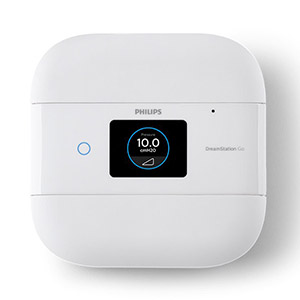
The DreamStation Go is what a portable CPAP machine should be. Easy to use, compact, reliable, and light. Where some CPAP machines feel like they’ve been cobbled together from leftover VCRs, the DreamStation Go is 21st century tech.
What we like: The DreamStation Go CPAP machine is built to last. We like the USB charging port, the integrated power supply, the full-color touchscreen, and the light, flexible tube. It also comes with its own nifty carrying case.
Flaws: Would be at the top of our list if not for the price.
2. ResMed AirMini
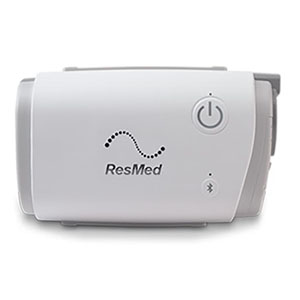
If you’re looking for a highly portable, high-quality CPAP machine that won’t let you down on the road, consider the ResMed AirMini. It features auto-adjusting pressure, Bluetooth connectivity, and exhalation relief for smooth breathing.
What we like: We like how small the unit is. It’s not going to take over the bed. Also, it’s light and easy to manipulate. We also appreciate the waterless humidification and that it syncs with the ResMed app. It’s FAA approved as well.
Flaws: Not the quietest CPAP machine you’ll find. And it’s not widely compatible with different masks.
3. Apex Medical XT Fit
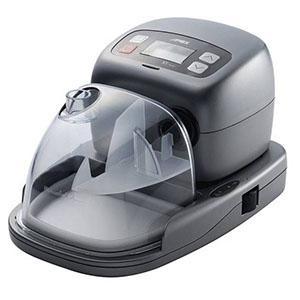
The Apex XT Fit is very simple and effective. There’s no adjusting the pressure, so no need for a complicated menu system. But it can’t be synced, and can’t record data. It can and does, however, provide moist, pressurized air without wavering.
What we like: We like that you have the option to include the humidifier or not. We appreciate that the display screen is easy to understand, and that the machine ramps up in 5-minute intervals. It also comes with a 6-foot hose and two-year warranty.
Flaws: While it’s often touted as a travel CPAP machine, it’s probably too bulky for that. That is, unless ‘travel’ means traveling in an RV.
4. Resmart Auto Bi-Level CPAP Machine
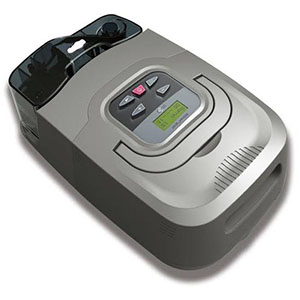
What sets the Resmart Auto Bi-Level CPAP Machine apart from the competition is that it provides different pressures for inhalation and exhalation. That enables a much more natural breath cycle while keeping your air passages open.
What we like: The auto-adjusting pressure levels work like a charm. The heated humidifier prevents both nose and throat from drying out. And the fold-away handle on the top makes moving the device around easy as pie.
Flaws: Too large to travel with easily. And at 30 decibels it’s one of the louder machines on our list.
5. Transcend 365 Mini CPAP
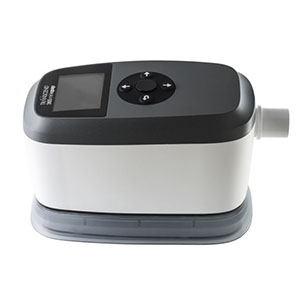
What happens if you get to your hotel room in Prague and the outlets don’t match your CPAP machine? If you have the Transcend 365 Mini, what happens is turn it on. That’s because this is the world’s only battery-powered portable CPAP machine.
What we like: We appreciate the high build quality of the unit. We like the clean design and lack of superfluous bells and whistles. The integrated battery management system does a good job of conserving energy. And it doesn’t use gallons of water.
Flaws: Not widely available. It’s also fairly noisy at nearly 30 dB, and it’s expensive for such a small unit.
6. ResMed AirSense 10 CPAP Machine
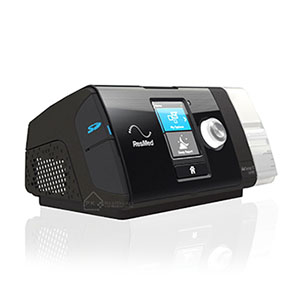
Click here for the lowest price on Amazon
In contrast to the company’s AirStart 10, the ResMed AirSense 10 features automatic pressure adjustment and incremental pressure ramping. Save your sleep data to an SD card and review it later using the smartphone app.
What we like: The design is very efficient and effective. The auto-adjusting pressure is reliable and accurate. The humidifier is large enough to keep going for hours but not so large as to make the unit clumsy. And the control panel is reasonably intuitive.
Flaws: The hose could be longer, and the app is nothing to write home about. The LCD screen also seems a bit outdated.
7. ResMed AirStart 10
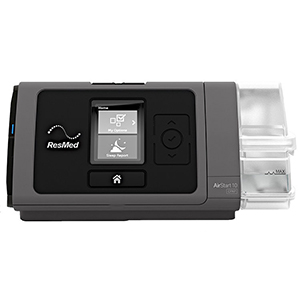
The AirStart 10 is one of the simpler devices on our list. The pressure is fixed, so setup and operation are quick and easy. And that will be fine with a lot of people. Just make sure one of those people is your doctor.
What we like: We appreciate the integrated humidifier that automatically adjusts to prevent drying out your airways. Also, you don’t need to be an engineer to set it up. Operation is simple (some would say ‘basic’). And it’s reasonably priced.
Flaws: Don’t judge a book by its cover because while it’s reliable and effective, it looks cheap and outdated.
8. SleepStyle Auto CPAP Machine
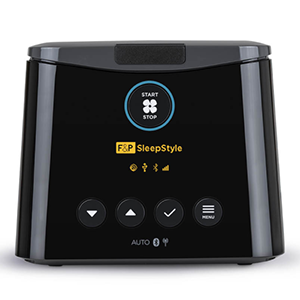
This is one of our favorite looking CPAP machines. Not that looks are everything. But the sleek minimalist design indicates this isn’t just repurposed tech given a paint job and a new name. It was built new from the ground up, and it shows.
What we like: We appreciate the control panel which is contemporary, well-considered and easy to use. We like the generous water reservoir, the reliable Bluetooth connectivity, and the relatively quiet 28-decibel operation.
Flaws: Curiously, the app itself isn’t really up to 2020 tech standards. And while it includes a nice carry bag you can’t really call it a ‘travel’ machine.
9. DeVilbiss IntelliPAP CPAP Machine
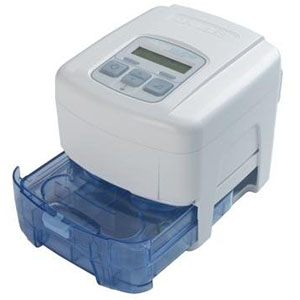
The IntelliPAP from DeVilbiss is quiet and reliable and comes with a humidifier that can be connected or disconnected at will. The unit is stable, the controls intuitive, and at 26 decibels it won’t keep anyone else in the room awake all night.
What we like: We like the logical control panel. We appreciate the build quality and the large water tank. The unit is also quiet, even with the humidifier engaged. It also compensates for altitude and has a ramp time of 45 minutes.
Flaws: Having the tube extend from the back of the unit looks good but is kind of impractical.
10. Philips DreamStation Auto
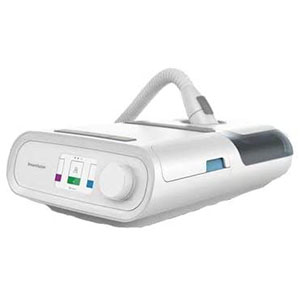
Click here for the lowest price on Amazon
This is one of the most popular CPAP machines on the market. It’s compact, full-featured has an integrated humidifier auto-adjusts. It’s light too, which makes it one of the few humidifier units that can realistically be called a travel unit.
What we like: We appreciate the compact convenience of the machine: the modest weight and well-considered design. The screen is large and bright and easy to navigate using the control wheel. And it all packs away neatly into the carrying case.
Flaws: Learning the ins and outs of the machine can take some time. The menu icons are small.
Who Needs A CPAP Machine?
The CPAP (Continuous Positive Air Pressure) machine is the most effective treatment yet devised for dealing with sleep apnea. Recent estimates are that as many as a billion people suffer some degree of sleep apnea (1). And that sleep apnea is just the tip of a larger systemic iceberg within the sufferer. That means a billion people may also be suffering from comorbidities, including high blood pressure, reduced insulin sensitivity, and more. All of these people would likely benefit from a CPAP machine.
Also, those who have contracted the coronavirus and whose pathology has devolved into Acute Respiratory Distress Syndrome (ARDS) may benefit from using the CPAP machine as a ventilator. The FDA has endorsed this repurposing. As a result, it is being put into practice worldwide. As the covid-19 crisis unfolds, the once little known CPAP machine may wind up playing a central role in the survival of countless individuals.
How We Ranked
All CPAP machines utilize the same group of components, and so sizing them up is not as complicated a matter as it may seem.
When inspecting the various CPAP machines, our first area of concern was the airflow generator. Since the effectiveness of the entire machine depends on this core component. It should be able to produce a smooth, steady stream of pressurized air with no interruptions or glitches and should switch easily from setting to setting. If the machine offers automatic adjustment that must be dependable, swift, and accurate.
The face mask is the delivery system for the pressurized air. If it doesn’t do its job, the facility of the airflow generator won’t matter much. So each device that made our list had to include a face mask – regardless of its form – that stayed in place with minimal fuss and wasn’t overtly uncomfortable.
If the device had an integrated humidifier it must do a good job delivering moist, agreeable air and be easily adjustable. Also, the water tank should not spill water all over the place if you need to move the machine for some reason. The device, even with the humidifier running, should also be quiet enough not to interfere with sleep. Otherwise, what’s the point? Air filters should also be effective and easily cleanable or replaceable by non-engineers.
When it came to travel CPAP units we looked for ones that are compact, light, and reliable. It helped if they also came with a handy carrying case of their own.
FAQs
Q: Do CPAP machines actually work?
A: Yes. CPAP machines are considered frontline technology in the battle against sleep apnea and its comorbidities. Today’s machines are the direct descendants of larger, far more involved machines that were once the exclusive domain of the hospital or clinic. By providing pressurized air to the sleep apnea sufferer while they sleep, the CPAP machine ensures their air passage stays open and that their night is uneventful.
Q: Can a CPAP machine be used as a ventilator?
A: Yes, a CPAP machine can be used as a ventilator. Several years ago emergency medical technicians began using CPAP machines for respiratory emergencies. The practice became so widespread that it is now standard operating procedure (2). With covid-19 related ARDS cases straining the ability of healthcare systems to respond, the FDA has cleared CPAP machines for use as ventilators to fill the equipment void (3).
Q: Can a CPAP machine fight the coronavirus?
A: The CPAP machine was designed to mitigate sleep apnea. However, as we’ve just seen, the machine can be put to use as an emergency ventilator. And the FDA has, in fact, issued an Emergency Use Authorization (EUA) for health professionals to do just that. However, the CPAP machine cannot and should not be expected to fight the coronavirus itself. What it can do is provide respiratory relief for those whose covid-19 symptoms have morphed into Acute Respiratory Distress Syndrome or ARDS.
Q: Do I need a prescription for a CPAP machine?
A: This can be the cause of much confusion because prescriptions are typically required to buy the airflow generator, face mask, and, in some cases, the humidifier. That’s because the FDA classifies them as class II medical devices (4). At the same time, however, accessories such as hoses, air filters and other parts of the mechanism that are crucial to the operation of the CPAP unit can be freely purchased without a prescription.
Q: Why are prescriptions sometimes required?
A: While CPAP machines have made the leap from hospital to home, they are still considered specialty medical hardware. Prescriptions are based on medical evaluations. They determine the pressure at which to set a specific person’s machine should. The FDA does not believe in letting people find their own comfort zone. As this could lead to significant health problems should the wrong pressure be employed.
Q: How long does it take a CPAP machine to cure sleep apnea?
A: A CPAP machine is not intended nor is it capable of, curing sleep apnea. It is more akin to a hearing aid, which doesn’t cure hearing loss but instead compensates for that loss. You need to wear the hearing aid every day if you wish to hear clearly. Likewise, the CPAP machine overrides a person’s physiological tendency toward sleep apnea. But you will need to use it every night if you wish to obtain a safe, restful night’s sleep.
Q: Why do some CPAP machines have humidifiers?
A: Dry, congested nasal passages are sometimes an unfortunate side effect of using the CPAP machine. Humidifiers add moisture to the air the person is breathing, fending off dry nasal passages and preventing congestion. Most home-oriented CPAP machines have integrated humidifiers. However, to save on size and weight, most ‘travel’ CPAP machines do not include this feature.
Q: Will I still need a CPAP machine if I lose weight?
A: Since sleep apnea is often associated with obesity, people wonder if losing weight will eliminate the need for a CPAP machine. The answer is: it depends on the individual. While sleep apnea is often associated with being overweight, that is not the only possible cause. Asthma, chronic nasal congestion and genetics may also play a role in the development of sleep apnea (5). So losing weight may help. Or it may not.
Q: Can I use an adjustable bed instead of a CPAP machine?
A: Research evidence suggests that using an adjustable bed to elevate the head at night may be effective in reducing sleep apnea (6). That is certainly good news and very significant. However, if you read the study results carefully, you’ll see the adjustable bed doesn’t actually cure sleep apnea. It just reduces its frequency and severity. Those are both good things also. But you’re still likely to need a CPAP machine to achieve complete relief.
Q: Why does my CPAP mask come off while I sleep?
A: Sometimes it’s a matter of the mask being too big or too loose. Other times it’s a matter of a person freeing themselves from something that’s bothering them. People are constantly moving pillows, throwing back blankets, and even pushing away their bedmates during the night without thinking about it. The same sometimes happens with an uncomfortable CPAP mask. Without waking up, the person removes the mask and continues to sleep.
Q: Does a CPAP machine prevent snoring?
A: The extreme snoring of the sleep apnea sufferer (7) is the result of a constricted airway. Opening that airway with the CPAP machine can, in many cases, drastically reduce or even eliminate snoring. The pressurized air delivered by the machine props open the airway, preventing the tissue vibrations that produce the snoring sound. If you still snore just as loud, you should talk to your doctor. It may indicate that the pressure needs to be adjusted.
Q: How often do I need to clean the filters?
A: Anytime you notice the filters have become discolored, it’s time to clean them. Some manufacturers suggest cleaning the filters once a week. But that’s not mandatory. On the other hand, if the location is particularly dusty the filters may need to be cleaned more than once a week. And if you have disposable filters, don’t try and clean them. Simply toss them once they’ve become dirty.
Q: Why do I sometimes wake up feeling bloated?
A: If you wake up with a distended belly, it means you are swallowing air while you sleep. Due to the nature of the therapy (pressurized air), it’s no surprise that this would sometimes happen. If you find it happening often you should try sleeping in a different position, such as on your side. If that doesn’t alleviate the problem, you might want to discuss lowering the air pressure with your doctor. It may simply be a bit too strong for your physiology.
Q: Can I really take a CPAP machine on an airplane?
A: Yes, you can take a CPAP machine on an airplane. And, because it is considered a necessary medical device, the weight does not count against your carryon weight allotment. That said, you may have to spend a few minutes discussing the matter with security. So it often helps if you have a doctor’s note or the actual prescription with you when you travel.
Related Articles
Recap
Research indicates sleep apnea is at the heart of a nexus of degenerative health problems. A CPAP machine is one of the best-known ways to deal with the scourge of sleep apnea. The CPAP machine can not only restore deep, restful sleep, but also reverse or fend off the development of other, related conditions.
In the face of the unprecedented challenge presented by covid-19, the CPAP machine has also been cleared for use as a ventilator by the FDA. As a result, this typically obscure piece of medical hardware is being thrust into the healthcare spotlight at a critical time.
The CPAP machines on our list are all high-quality, reliable, affordable pieces of 21st century medical technology. Any one will undoubtedly serve you well whether your goal is to fight back against sleep apnea or obtain relief from covid-19 related ARDS.

